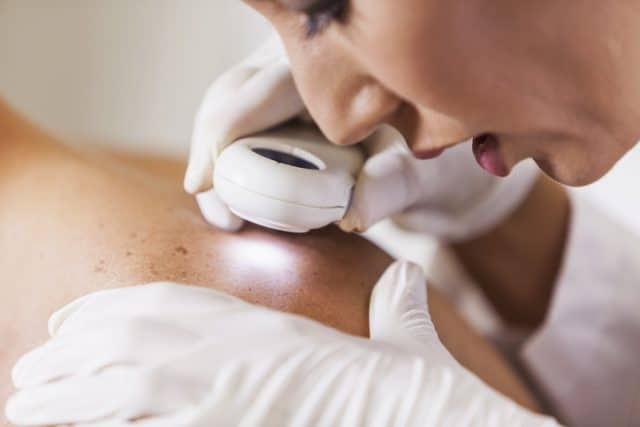The Importance of Annual Skin Cancer Screening

Seeing your dermatologist for an annual skin cancer screening is a powerful tool you can use to ensure your skin is healthy and help detect any skin abnormalities or concerns.
What Is a Skin Cancer Screening?
During a skin cancer screening, your dermatologist will check your entire body for skin blemishes that could be potential areas of concern. Your doctor will look at moles, birthmarks, freckles, and other spots and take note if there are any indications of irregularities that could be cancerous. A thorough skin cancer screening will include hidden or overlooked places on your body that includes the following areas:
- Scalp
- Between toes
- Inside and behind ears
- Back of legs
- Fingernails
- Beneath pubic hair
- Between the buttocks
People who have darker skin tones have more melanin in their skin which serves as a natural defense against skin cancer. However, if you’re in this group, you’re not immune to skin cancer. Your dermatologist will examine the following areas closely since they are more prone to developing cancerous growths:
- Toenails
- Fingernails
- Soles of feet
- Palms of hands
Why is it Important to Get a Skin Cancer Screening?
Skin cancer screenings are valuable if you’re at greater risk of developing skin cancer due to having a fairer complexion or having a number of moles and freckles. They’re also recommended for those with a family history of skin cancer or if you have a weakened immune system. Additionally, you can’t easily examine every part of your body such as your scalp, back, or the back of your thighs.
When Should I Get a Skin Cancer Screening?
There are no current guidelines of when you should get your first skin cancer screening. Don’t hesitate to see your dermatologist if you notice changes in the appearance of any moles or freckles. Generally, dermatologists recommend adding an annual screening to your general health care routine if you fall into the following categories:
- You have blond or red hair with light-colored eyes
- You sunburn easily
- You have a family history of skin cancer
- You’ve had an irregular mole before
- You’ve had many sunburns in the past, especially ones that caused blisters
- You’ve used tanning beds
- You have 50 or more moles
- You’ve received an organ transplant
If you are looking to get a skin cancer screening, make an appointment today at Florida Academic Dermatology Center or call 305-324-2110. Our experienced dermatologists are committed to giving you personalized care.